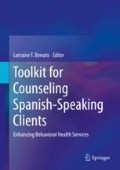Abstract
Latino youths do exhibit more antisocial behavior after the first generation living in the United States and especially when their parents lose their cultural ties to their country of origin (Duarte et al., 2008). More recently, Nuñez et al. (J Lat/O Psychol, 4(4): 202–217, 2016) found high rates of negative emotions related specifically to hostility and anger in Latino adolescents. These studies underscore the urgent need to develop an effective, culturally competent evidence-based therapy directed to meet the evident mental health needs of Latino adolescents diagnosed with disruptive disorders and comorbid depressive disorders. As we will discuss in the following chapter, Cabiya and his associates have developed a culturally adapted intervention for children and adolescents with Latinos that has been found to be effective in reducing aggressive behavior and improving anger management among Latino adolescents (Cabiya et al. Intam J Psychol, 42(2), 195–202, 2008); Cabiya & Lopez, 2015). In this chapter this research with anger management with Latino children and adolescents will be discussed along with the research on anger management with Latino adults. A set of treatment tools in Spanish is provided at the end of this chapter. In addition to an extensive discussion on anger management strategies for use with adolescents, treatment options for anger management with Latino adults are also discussed and resources are provided.
References
Barkley, R. A. (1998). Attention deficit hyperactivity disorder: A handbook for diagnoses and treatment (2nd ed.). New York: The Guilford Press.
Barkley, R. A., & Fischer, M. (2011). Psychiatry, predicting impairment in major life activities and occupational functioning in hyperactive children as adults: Self-reported executive function (EF) deficits versus EF tests. Developmental Neuropsychology, 36(2), 137–161.
Bauermeister, J. (1994). Desarrollo y utilización del inventario de comportamiento escuela (IDC-E) en la evaluación de niños puertorriqueños. San Juan, Puerto Rico: Author.
Cabiya, J. J., & López, N. M. (2015). Clinical assessment of Hispanic youth diagnosed with attentiondeficit/ hyperactivity disorder and other externalizing disorders. In K. F. Geisinger & K. F. Geisinger (Eds.), Psychological testing of Hispanics: Clinical, cultural, and intellectual issues (2nd ed., pp. 153–169). Washington, DC: American Psychological Association.
Cabiya, J., Orobitg, D., Padilla, L., Sayers, S., Bayón, N., & De La Torre, M. (2001). Cognitive and behavioral profile of Puerto Rican aggressive and impulsive adolescents. Science and Behavior, 16, 49–62.
Cabiya, J., Padilla, L., Martínez-Taboas, A., & Sayers, S. (2008). Effectiveness of a cognitive-behavioral intervention for Puerto Rican children. Interamerican Journal of Psychology, 42(2), 195–202.
Cabiya, J., Padilla, L., Sayers, S., Pedrosa, O., Pérez-Pedrogo, C., & Manzano-Mojica, J. (2007). Relationship between aggressive behavior, depressed mood, and other disruptive behavior in Puerto Rican children diagnosed with ADHD and ODD. Puerto Rico Health Sciences Journal, 25(3), 1–7.
Jarrett, M., Siddiqui, S., Lochman, J., & Qu, L. (2014). Internalizing problems as a predictor of change in externalizing problems in at-risk youth. Journal of Clinical Child and Adolescent Psychology: The Official Journal for the Society of Clinical Child and Adolescent Psychology, American Psychological Association, Division 53, 43(1), 27–35. doi:10.1080/15374416.2013.764823
Kazdin, A. E., & Weisz, J. R. (2010). Evidence-based psychotherapies for children and adolescents (2nd ed.). New York: The Guilford Press.
Lochman, J. E., Baden, R. E., Boxmeyer, C. L., Powell, N. P., Qu, L., Salekin, K. L., & Windle, M. (2014). Does a booster intervention augment the preventive effects of an abbreviated version of the coping power program for aggressive children? Journal of Abnormal Child Psychology, 42, 367–381. doi:10.1007/s10802-013-9727-y
Lochman, J. E., Boxmeyer, C. L., Powell, N. P., Qu, L., Wells, K., & Windle, M. (2012). Coping power dissemination study: Intervention and special education effects on academic outcomes. Behavioral Disorders, 37, 192–205.
Lochman, J. E., Curry, J. F., Dane, H., & Ellis, M. (2001). The anger coping program: An empirically-supported treatment for aggressive children. Residential Treatment for Children & Youth, 18(3), 63–73.
Lochman, J. E., Dishion, T. J., Powell, N. P., Boxmeyer, C. L., Qu, L., & Sallee, M. (2015). Evidence-based preventive intervention for preadolescent aggressive children: One-year outcomes following randomization to group versus individual delivery. Journal of Consulting and Clinical Psychology, 83(4), 728–735.
Lochman, J., Powell, N. P., Boxmeyer, C. L., & Jimenez-Camargo, L. (2011). Cognitive-behavioral therapy for externalizing disorders in children and adolescents. Child and Adolescent Psychiatric Clinics of North America, 20(2), 305–318.
Lochman, J. E., & Wells, K. C. (2004). The coping power program for pre-adolescents aggressive boys and their parents: Outcome effects at the 1 year follow-up. Journal of Consulting and Clinical Psychology, 72(4), 571–578.
López Blanco, B., Rodríguez García, E., Vázquez Pineda, F., & Alcázar, R. J. (2012). Intervención cognitivo conductual para el manejo de la ira. = Cognitive behavioral intervention for anger management. Revista Mexicana De Psicología, 29(1), 97–104.
Manzano-Mojica, J., Cabiya, J., Sayers, S., & Padilla, L. (2005). Anxiety and depression associated to externalizing disorders in Puerto Rican youth in public schools ages 8 to14. Journal of Hispanic American Psychiatry, 4, 16–27.
Nuñez, A., González, P., Talavera, G. A., Sanchez-Johnsen, L., Roesch, S. C., Davis, S. M., … Gallo, L. C. (2016). Machismo, marianismo, and negative cognitive-emotional factors: Findings from the Hispanic community health study/study of Latinos sociocultural ancillary study. Journal of Latina/O Psychology, 4(4), 202–217. doi:10.1037/lat0000050
Treuting, J., & Hinshaw, S. (2001). Depression and self-esteem in boys with attention deficit hyperactivity disorder: Associations with comorbid aggression and explanatory attributional mechanism. Journal of Abnormal Child Psychology, 29(1), 23–29.
Sevillá, J., & Pastor, C. (2016). Domando al dragon. Madrid: Alianza Editorial.
Author information
Authors and Affiliations
Corresponding author
Editor information
Editors and Affiliations
Appendices
Sesión 1
Estableciendo la estructura del grupo y el procedimiento para el establecimiento de metas conductuales


Sesión 2
Estableciendo metas personales a corto y largo plazo


















Rights and permissions
Copyright information
© 2017 Springer International Publishing AG
About this chapter
Cite this chapter
Cabiya, J.J. (2017). Tools for Treating Anger, Aggression, and Disruptive Behavior Among Latino Adolescents. In: Benuto, L. (eds) Toolkit for Counseling Spanish-Speaking Clients. Springer, Cham. https://doi.org/10.1007/978-3-319-64880-4_16
Download citation
DOI: https://doi.org/10.1007/978-3-319-64880-4_16
Published:
Publisher Name: Springer, Cham
Print ISBN: 978-3-319-64878-1
Online ISBN: 978-3-319-64880-4
eBook Packages: Behavioral Science and PsychologyBehavioral Science and Psychology (R0)

